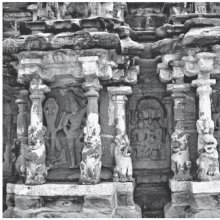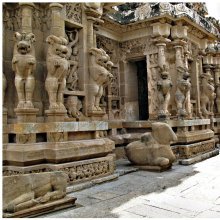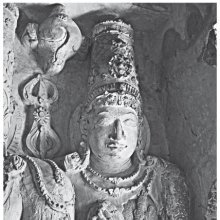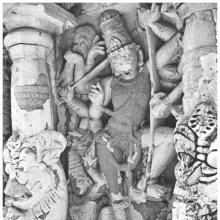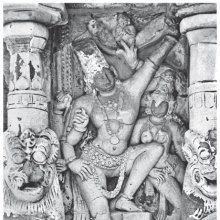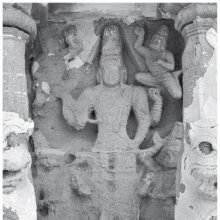No, Nō, Ño, Ñō, Ṇo, Ṇō, Ṉo, Ṉō: 13 definitions
Introduction:
No means something in Hinduism, Sanskrit, the history of ancient India, Marathi, Tamil. If you want to know the exact meaning, history, etymology or English translation of this term then check out the descriptions on this page. Add your comment or reference to a book if you want to contribute to this summary article.
Images (photo gallery)
(+332 more images available)
India history and geography
Source: Shodhganga: Vernacular architecture of Assam with special reference to Brahmaputra ValleyNo is a Dimasa Kachari term referring to “house”.—It appears in the study dealing with the vernacular architecture (local building construction) of Assam whose rich tradition is backed by the numerous communities and traditional cultures.

The history of India traces the identification of countries, villages, towns and other regions of India, as well as mythology, zoology, royal dynasties, rulers, tribes, local festivities and traditions and regional languages. Ancient India enjoyed religious freedom and encourages the path of Dharma, a concept common to Buddhism, Hinduism, and Jainism.
Languages of India and abroad
Marathi-English dictionary
Source: DDSA: The Molesworth Marathi and English Dictionarynō (नो).—ind A vocative particle plural. Ex. dēvāciyēṃ bhajana karā || tarīñca bhava tarāla bāpanō ||.
Source: DDSA: The Aryabhusan school dictionary, Marathi-Englishnō (नो).—ind A vocative particle-plural.
Marathi is an Indo-European language having over 70 million native speakers people in (predominantly) Maharashtra India. Marathi, like many other Indo-Aryan languages, evolved from early forms of Prakrit, which itself is a subset of Sanskrit, one of the most ancient languages of the world.
Sanskrit dictionary
Source: DDSA: The practical Sanskrit-English dictionaryNo (नो).—ind. (na + u) No, not; often used like न (na) q. v.; न च तत् प्रेत्य नो इह (na ca tat pretya no iha) Bhagavadgītā (Bombay) 17.28; Pañcatantra (Bombay) 5.24; Amaruśataka 6,8,1,62; गोप्याधिभागे नो वृद्धिः सोपकारेऽथ हापिते (gopyādhibhāge no vṛddhiḥ sopakāre'tha hāpite) Y.2.59.
Source: Cologne Digital Sanskrit Dictionaries: Shabda-Sagara Sanskrit-English DictionaryNo (नो).—ind. No, not. E. naha to command, aff. ḍo.
Source: Cologne Digital Sanskrit Dictionaries: Benfey Sanskrit-English DictionaryNo (नो).—i. e. na-u, a particle. 1. Nor, [Suśruta] 2, 461, 18. 2. Not, [Pañcatantra] i. [distich] 97.
Source: Cologne Digital Sanskrit Dictionaries: Cappeller Sanskrit-English DictionaryNo (नो).—(na + u) [adverb] neither, nor; not.
Source: Cologne Digital Sanskrit Dictionaries: Monier-Williams Sanskrit-English Dictionary1) No (नो):—[from na] a See sub voce
2) b ind. ([from] 2. na + u) and not, [Ṛg-veda; Śatapatha-brāhmaṇa; Mahābhārata; Kāvya literature] etc. (in later language also = na, ‘not’, for which it is generally used to suit the verse; no ced See under ced; no vā ‘or not’).
Source: Cologne Digital Sanskrit Dictionaries: Yates Sanskrit-English DictionaryNo (नो):—adv. No, not.
[Sanskrit to German]
Sanskrit, also spelled संस्कृतम् (saṃskṛtam), is an ancient language of India commonly seen as the grandmother of the Indo-European language family (even English!). Closely allied with Prakrit and Pali, Sanskrit is more exhaustive in both grammar and terms and has the most extensive collection of literature in the world, greatly surpassing its sister-languages Greek and Latin.
Kannada-English dictionary
Source: Alar: Kannada-English corpusNō (ನೋ):—[verb] = ನೋಯು [noyu].
Kannada is a Dravidian language (as opposed to the Indo-European language family) mainly spoken in the southwestern region of India.
Tamil dictionary
Source: DDSA: University of Madras: Tamil LexiconÑo (ஞொ) . The compound of ஞ் [gn] and ஒ. [o.]
--- OR ---
Ñō (ஞோ) . The compound of ஞ் [gn] and ஓ. [o.]
--- OR ---
Ṇo (ணொ) . The compound of ண் [n] and ஒ. [o.]
--- OR ---
Ṇō (ணோ) . The compound of ண் [n] and ஓ. [o.]
--- OR ---
No (நொ) . The compound of ந் [n] and ஒ. [o.]
--- OR ---
No (நொ) noun [Kanarese, Malayalam: nō.]
1. Pain, distress, suffering; துன்பம். [thunpam.] (தொல். எழுத். [thol. ezhuth.] 72.) நொவ்வுற லெய்தி [novvura leythi] (கந்தபு. திருவவ. [kanthapu. thiruvava.] 39).
2. Disease, sickness; நோய். [noy.] (W.)
3. Lightness, slenderness; நொய்ம்மை. (திவா.) நொப்புணை வலியா [noymmai. (thiva.) noppunai valiya] (பெருங்கதை உஞ்சைக். [perungathai unchaig.] 53, 3).
--- OR ---
No (நொ) [notal] 13 transitive verb & intransitive To suffer; துன்புறுதல். நொக்கொற்றா [thunpuruthal. nokkorra] (தொல். எழுத். [thol. ezhuth.] 72, உரை [urai]). நொப்போவெள [noppovela] (நன். [nan.] 137).
--- OR ---
Nō (நோ) The compound of ந் [n] and ஓ. [o.]
--- OR ---
Nō (நோ) [nōtal] 13 intransitive verb [K. nō, M. nōka.]
1. To feel pain, ache, suffer, smart; நோவுண்டாதல். கண் நொந்தது. [novundathal. kan nonthathu.]
2. [Telugu: nogulu.] To be grieved, distressed in mind; to feel aggrieved; வருந்துதல். ஊரன்மீ தீப்பறக்க நொந் தேனும் யானே [varunthuthal. uranmi thipparakka non thenum yane] (நாலடியார் [naladiyar], 389).
3. To complain; துன்பத்தைச் சொல்லுதல். நோவற்க நொந்த தறி யார்க்கு [thunpathais solluthal. novarka nontha thari yarkku] (திருக்குறள் [thirukkural], 877).
4. To be injured, bruised, as a plant, fruit; to be spoiled, as boiled rice; பதனழிதல். நொந்தன்னம் [pathanazhithal. nonthannam] (பதார்த்தகுண சிந்தாமணிமேகலை [patharthaguna sindamani] 1459).
5. To be impoverished; to grow poor; வறுமைப்படுதல். நொந்த குடி. [varumaippaduthal. nontha kudi.]
--- OR ---
Nō (நோ) noun < நோ-. [no-.]
1. [K. nōta.] Aching, pain, smart; வலி. [vali.]
2. Distress, grief; துன் பம். நோநொந்து [thun pam. nononthu] (திருக்குறள் [thirukkural], 157).
3. Illness; வியாதி. [viyathi.] (W.)
4. Injury, bruise, as in the body, a tree, a fruit; சிதைவு. [sithaivu.] (W.)
5. Weakness, infirmity, decay; பலவீனம். [palavinam.]
--- OR ---
Ṉo (னொ) . The compound of ன் [n] and ஒ. [o.]
--- OR ---
Ṉō (னோ) . The compound of ன் [n] and ஓ. [o.]
--- OR ---
Nō (நோ) [nōtal] 13 transitive verb To hate; வெறுத்தல். ஏதிலரை நோவதெவன் [veruthal. ethilarai novathevan] (நீதிநெறிவி. [nithinerivi.] 25).
Tamil is an ancient language of India from the Dravidian family spoken by roughly 250 million people mainly in southern India and Sri Lanka.
See also (Relevant definitions)
Starts with (+867): Asobhana, No di, No Dwelling Nirvana, No hui, No Strife Samadhi, No Thing Sphere, No Upada Rupa, No-asa-gao, No-boro, No-budo, No-chabada, No-eye pea, No-geito, No-geshi, No-mame, No-mind state, No-nothe, No-panaa-noe, No-paro, No-roh.
Ends with (+494): Acano, Acer mono, African kino, Agbano, Agbono, Aguano, Aidinono, Ainya-nwono, Ajahn Pasanno, Akhano, Akpano, Akudono, Amalatuno, Amano, Ambarino, Ammano, Amor fino, Angavodiandrano, Annamano, Anno.
Full-text (+14739): Niruttara, Ananya, Nahi, Antarvana, Anadi, Alinga, Ano, Ajatasatru, Ma nao, Nih-gno, Ala nao, Long nao, Somma nao, Mak nao, Nishkula, Nao yu hua, Niraksha, Talaino, Pralagna, Chamanda.
Relevant text
One of your search terms exceeds the minimun character amount per search term. This amount currently equals 2.
No search results for No, Nō, Ño, Ñō, Ṇo, Ṇō, Ṉo, Ṉō, Nao, Gno, Gnao; (plurals include: Naos, Gnos, Gnaos) in any book or story.
Related products
(+254 more products available)
